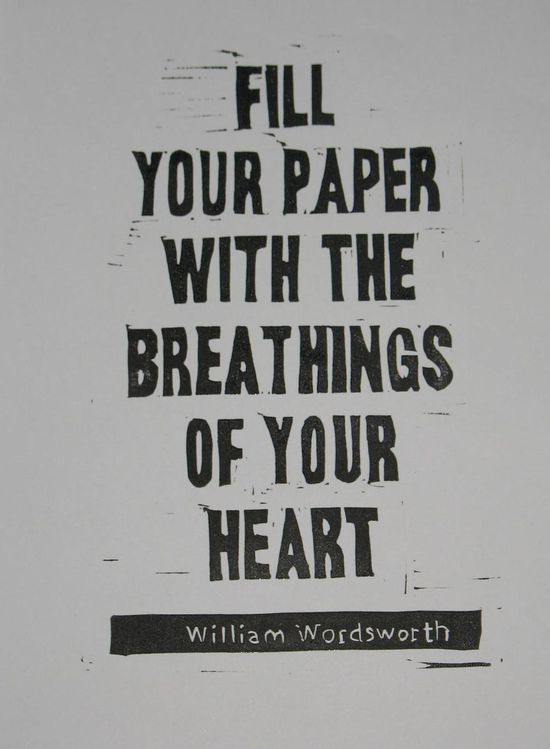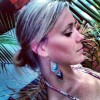I used to trust my own voice.
I used to believe in the words that flowed from the hollow at the center of my heart (for this is where words are born) to the pen I gripped in my crooked little fist of a hand. I used to grip, not hold, the pen because there was a torrent of words pouring out of my fingers and I had to hold on tight and be quick in order to get them all out before the word-water reached my neck, my mouth, my nose and caused me to drown in a sea of unexpressed verbiage.
This is how I wrote, when I was 12. I wrote like a wild animal chasing its prey, or being chased as prey, always running towards something, or away from something, never stagnant.
I wrote all the time, every day. There were words living inside of me, filling me up with sentences and wordplay and stories. I felt them pushing and pulling and swelling, demanding attention. I remember asking my Mom once if there were words living inside of her too and she paused for a moment and looked at me like maybe I was a strange little girl and answered, “No. Not really.” (I later discovered that there were numbers living inside of my Mom—mathematical equations and Sudoku-like puzzles).
I remember thinking maybe I was a strange little girl. Maybe I was the only girl in the world with so many breathing, pulsing, yearning words living inside of her. And that thought frightened me, but only for a second, because I was a brave 12 year-old and knew I could survive the terrible fate of being a bearer of words as long as I kept writing them out of my body and into the world.
So, I wrote.
I filled journals and scribbled on pads of legal paper and spent hours and hours (whole days, whole weekends) sitting up in bed, warm and safe under my pink, ink-stained comforter with stacks of books as companions (for I read as much as I wrote) and leaky pens and blank sheets and stories born between heartbeats.
When I was 13, I wrote a novel. It is called Donna Jill’s Unforgettable Birthday Bash and the main character’s name, Donna Jill, was inspired by Candace Cameron’s DJ in Full House. She resembles her too: blond, blue-eyed, the eldest of three sisters. The story revolves around DJ and her three best friends and the adventures they encounter on DJ’s 13th birthday (they meet Luke Perry, for example).
It’s a terrible story and I read it now and cringe. But it was fiercely hand-written, all 60 pages of it, and it stands now as a snapshot of sorts, offering a glimpse into the dreams and fantasies of my 13 year-old self. It reminds me to be daring.
I was a daring 13, 16, 19-year old. I dared to write poems and letters to the editor and journal entries so scorching it burns to read them. I dared to be open, to be fragile, and to love. I loved the same way I wrote: ferociously and without hesitation. I wrote love letters to boys, to girls, to friends, to authors, to pen pals who lived halfway across the globe. I wrote a love letter to a bee once, sitting in a field of wild daisies, under a sky so blue it pierced my eyes to look at it.
When the bee perched on my writing hand I whispered, “please don’t hurt me because I love you,” and I do think she heard me because she flew away, leaving me stunned, but unstung.
I trusted in the truth of my words. I didn’t judge what ended up on the page, or wonder if what I wrote was worth writing, or worry about the reception it may or may not receive. I just wrote and, then, I shared what I wrote. I shared it with whoever was interested in reading it, in hearing it. I remember being 16, hanging out with my friend Renée, and her asking me to share with her family a fictional piece I had written for English class. So, I did. I pulled The Myth of the Seasons out of my backpack, stood up, and read to her family as they sat around the table drinking tea after dinner. This felt comfortable to me. I felt comfortable–writing and sharing, writing and sharing. It felt as natural as breathing.
Then, somewhere along the rickety road of growing up, my pouring of words slowed to a leaky faucet trickle and nearly stopped entirely. When I did write, I did so only for myself, not willing to share the inner workings of my soul with even my closest of friends. I grew timid. I grew quiet. I had suffered my share of irreparable heartache and, in my tender state, had begun to build a flesh-and-blood barricade between my heart and my fingers, between my heart and my throat. I shut myself up.
This happens.
We grow and we fall and we ache and we become cautious. We slice open our hearts and reveal the shiny messy insides to people who take those shiny messy insides and crush them and we promise never to slice ourselves open again. We start to doubt. We doubt we had anything worthy to say (or to draw or to paint or to sing) in the first place. We drink, we smoke, we party all night and sleep all day, quieting the calling that resides in our cells, convincing ourselves we were no good at it anyway.
But the calling never dies, not entirely, and there comes a time (in our thirties, or forties, or fifties, or later) when the words (or the drawings or the paintings or the songs) that live inside of us can no longer be suppressed and we start to feel the cracking of the flood barriers and the rising of the tide. It rises and rises and, like an old beloved yet terrifying friend, it asks us to be brave again.
We must bravely express what lives inside of us because we must make space inside of us–space to hold (fear, grief, pain, longing, love) and space to let go (of fear, grief, pain, longing, love). We must bravely express what lives inside of us because our bodies and minds and hearts are not meant to be stagnant waterholes (things fester there), but flowing waterways connecting the outer world to the inner world, emptying and filling, transforming all the time. We must bravely express what lives inside of us because this is how we set it free (it is the only way) and this is how we set ourselves free. And this is how we heal.
I returned to my pen in 2010 by starting a blog I expected nobody to read. But people have read it, do read it, and some even really like it. Last week, I received an email from a complete stranger expressing gratitude for my words and asking me to please keep writing as my perspective on things has shifted her world a little.
And here is the thing, friends, here is the kernel: We must bravely express what lives inside of us because what lives inside of us has the power to shift worlds a little.
After months of neglecting my blog and barely writing at all, I have recently picked up my pen and felt my confidence grow with every ink stain, every hand cramp, every nine o’clock sunset that tells me I have written the whole day away. I have broken my own promise of never slicing myself open again and I have stocked up on Band-Aids for I know there will be blood. I have submitted my words for publication, to an elephant I know, and it has responded like a happy trumpeter. I have asked my heart for forgiveness, for all those times I forced her to sit in silence, and I have started humming away the lump in my throat (which has almost completely dissolved).
Every morning, I write. I stretch and bow to a new day, make some tea, take deep breaths and write.
I write to connect to my own brokenness and I write to help others connect to theirs. I write ferociously and without hesitation. I write like my health depends on it (because it does). I write because it is one of the things I am meant to do, in the time that I have here on Earth. I write because I love it, because I hate it, because I have to, because I choose to be brave.
“Let me live, love, and say it well in good sentences.” ~ Sylvia Plath, The Unabridged Journals of Sylvia Plath
Love elephant and want to go steady?
Sign up for our (curated) daily and weekly newsletters!
~Apprentice Editor: Kathryn Muyskens / Editor: Catherine Monkman
Photo: Author’s Own







Read 2 comments and reply